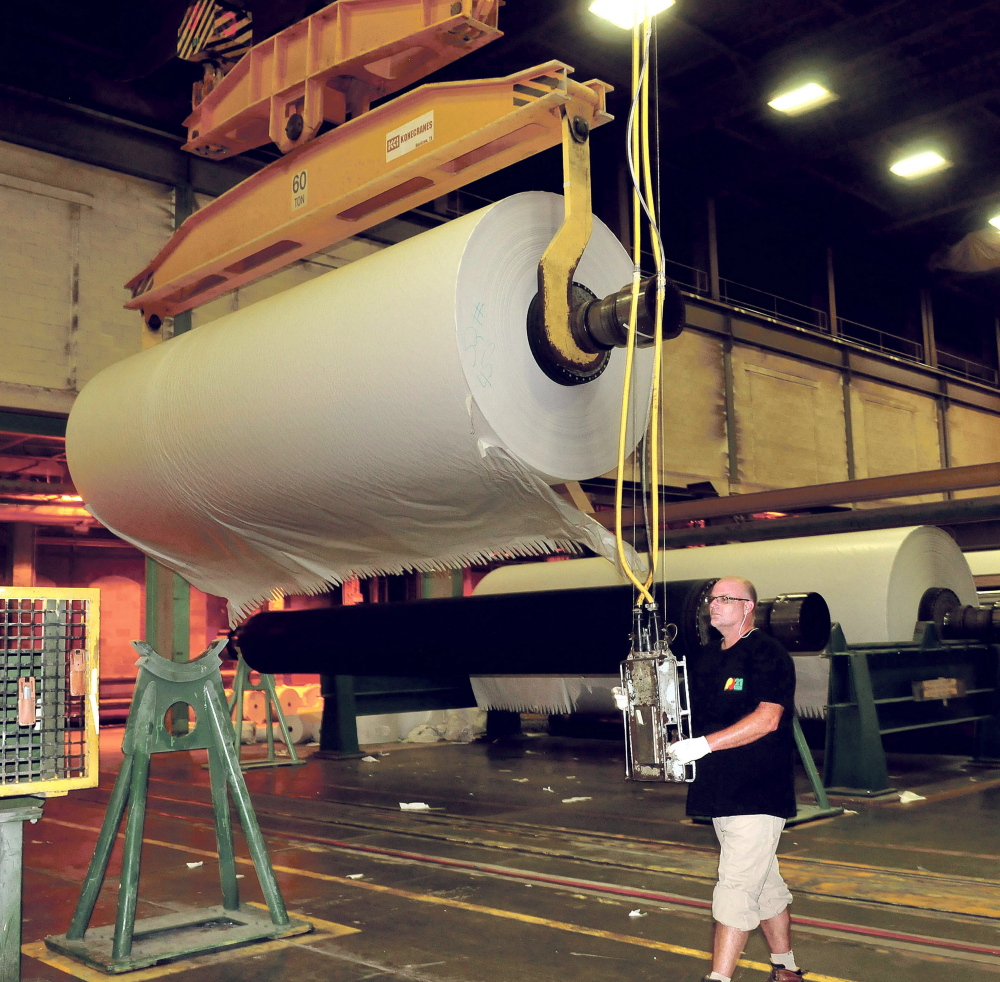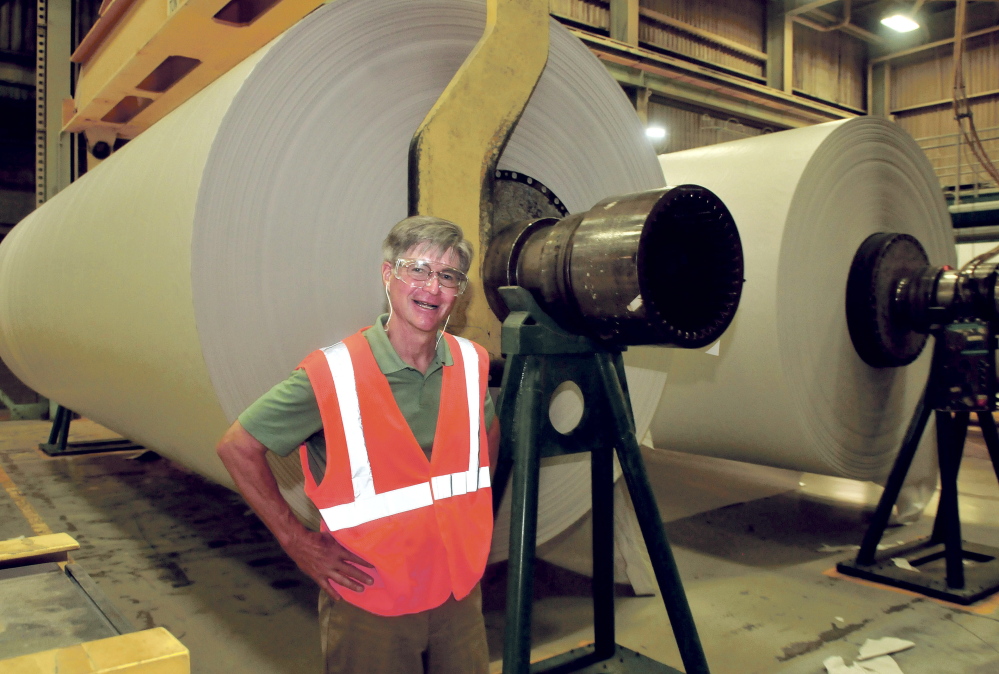MADISON — A federal ruling allowing the U.S. government to put duties on paper being imported from Nova Scotia last month was good news for Madison Paper Industries.
Given recent layoffs, mill closings and drops in tax revenue, it’s some of the only good news the paper industry has had lately in Maine.
With the preliminary ruling issued July 27 in place, the U.S. Department of Commerce has started charging duties on paper from Nova Scotia’s Port Hawkesbury Paper, and mill officials in Madison hope the ruling will be upheld when a final decision is made in November.
But the duties are only part of the puzzle in keeping mills like the one in Madison running. Thursday’s announcement that 300 workers will lose their jobs at Verso Corp.’s Androscoggin Mill in Jay was a harsh reminder of how precarious the industry is.
At least one industry expert says that the new duties still won’t be enough to counter the decline in demand for paper, and Russ Drechsel, president of UPM Madison, said that until the region’s high energy costs are tackled, the mill will continue to suffer economically.
The U.S. dollar is also getting stronger, a factor that was cited by Verso when it announced the impending layoffs scheduled to go into effect later this year. Energy costs were also cited as a factor in both that layoff and Verso closing its mill in Bucksport last year.
Drechsel won’t comment on the long-term viability of the Madison mill, which employees about 225, but in a tour of the mill last week, he admitted those factors make the long-term success of the mill a battle.
LOWERING ENERGY COSTS
In February, the Madison mill shut down for two weeks, putting nearly all of its workers on furlough.
“We regret having to take this downtime, but conditions in the U.S. market for supercalendered paper, combined with the increased energy costs we incur during the cold winter months, require us to reduce production,” Drechsel wrote to Maine lawmakers announcing the two-week shutdown at the mill.
Hot weather also causes energy issues.
On a recent summer day, the cost of electricity, which is used to make steam for the papermaking process, was at $58 per megawatt hour.
With the hot weather that day, the price went up to $330 and the mill shut down, using the time to do required maintenance.
Demand for electricity can force prices to get as high as $400 per megawatt hour in the winter, which makes it too expensive for the mill to operate. It’s not always so bad in the summer, but employees still spend time closely monitoring energy prices.
The type of shutdowns that happened last week usually happen six to eight times per year. Usually it’s an opportunity to do maintenance work, but in February it meant the two-week furlough.
The Madison mill is one of the major customers of the Summit Natural Gas pipeline that extends up the Kennebec River valley. But Drechsel said more focus has to be put on natural gas in the state for it to make a difference.
On Friday, the day after the layoffs in Jay were announced, Gov. Paul LePage issued a statement pledging to lower energy costs in Maine through three pieces of legislation that he introduced in the last legislative session.
Drechsel, who testified at a hearing for one of the bills, said that while the legislation could be of benefit, the single most important thing to lower energy costs is for more natural gas pipeline to be built in New England.
“Not having the gas pipeline capacity delivering natural gas to the New England electricity generators has cost all ratepayers in new England billions and billions of dollars over the last two winters,” he said. “Everything else should be taking second seat until New England has two new natural gas pipelines.”
DUTIES IN PLACE
Jesse Marzouk, vice president of Hilco Valuation Services in Chicago and a paper industry analyst, said last week that demand for supercalendered and lightweight paper has dropped as much as 8 to 9 percent in the last 10 to 15 years.
“The one instance of putting duties on place really doesn’t change the long-term outlook for what’s happening on the demand side,” he said. “That’s a much more significant factor than any duties that we place on one or a couple of producers.”
Supercalendered paper, the type made by Madison, has weathered the decline in demand slightly better than coated paper, the type made in Jay, Marzouk said. That’s because supercalendered paper, which is made glossy through a machine that applies steam and pressure, is a cheaper alternative to coated paper, which has a latex covering. As a result, more publishers are switching away from coated paper to supercalendered, Marzouk said.
In February, Madison Paper joined a Minnesota-based supercalendered paper producer to file a complaint with the U.S. International Trade Commission and U.S. Department of Commerce alleging that the Port Hawkesbury Paper mill was receiving subsidies from the Nova Scotia government that violated international trade laws.
“As long as the subsidies in Canada persist, the health of the U.S. industry is in jeopardy,” Drechsel wrote in a letter to Maine lawmakers at the time.
A preliminary decision was issued by the commerce department last month, stating that they had found evidence the Nova Scotia government was granting illegal subsidies and that the U.S. could begin charging preliminary duties on imports from Port Hawkesbury.
More hearings are scheduled for October and a final decision should be made in late November, according to Drechsel, who said in July he is confident the preliminary decision will be upheld.
U.S. Rep. Bruce Poliquin, R-Maine, who visited Madison Paper on Saturday to discuss the issue with employees, also said he is confident the decision will be upheld and plans to fight for it alongside other Maine lawmakers.
“It’s certainly a big deal,” said Marzouk. “The duties that they’ve put in place on Port Hawkesbury are a significant percentage of the overall price, and Port Hawkesbury makes up approximately 25-30 percent of the capacity for supercalendered paper in North America.”
The Canadian company has denied that it is receiving illegal subsidies from the Nova Scotia government. It is planning to set up a company in the U.S. to absorb the duties so that customers don’t have to, according to Marzouk.
If the company is able to offset the cost of the duties, it could mean that U.S. producers, including Madison Paper, won’t see as much of a benefit.
Send questions/comments to the editors.





Success. Please wait for the page to reload. If the page does not reload within 5 seconds, please refresh the page.
Enter your email and password to access comments.
Hi, to comment on stories you must . This profile is in addition to your subscription and website login.
Already have a commenting profile? .
Invalid username/password.
Please check your email to confirm and complete your registration.
Only subscribers are eligible to post comments. Please subscribe or login first for digital access. Here’s why.
Use the form below to reset your password. When you've submitted your account email, we will send an email with a reset code.